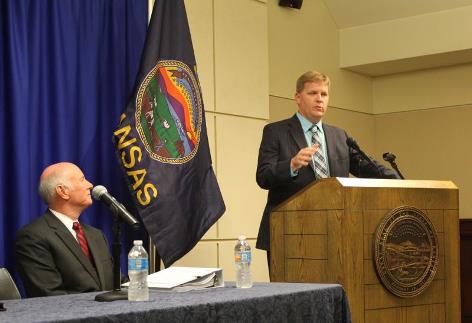Recommendations include dropping monthly projections from report
by Andy Marso, KHI News Service
A working group appointed by Gov. Sam Brownback unveiled Tuesday a host of recommendations for changing the way Kansas officials estimate the amount of tax revenue the state will receive each year.
The recommendations include overhauling the group that makes the estimates and making a controversial change to the way monthly tax revenue is reported.
The governor’s office and the Legislature use the tax revenue estimates as a guide to the amount the can spend for all services, including education, health care and transportation.
The current process has been in place for decades. But state revenues have consistently failed to meet estimates since 2012, when Brownback and the Legislature approved significant income tax cuts and then followed with increases in other taxes in subsequent years.
Missed revenue targets have forced Brownback and legislators to make several midyear budget cuts.
Sam Williams, a retired accountant tapped to lead the working group, said the inability to adapt to the tax changes shows the revenue estimating process needs improvement.
“When there’s a significant tax policy change, the system breaks down, and that’s exactly what we’ve been through in the state of Kansas the last four years,” Williams said.
A consensus revenue estimating group makes tax revenue projections twice a year. The group includes representatives of the Division of the Budget, Kansas Department of Revenue and Kansas Legislative Research Department and one consulting economist each from the University of Kansas, Kansas State University and Wichita State University.
Williams’ group recommended eventually removing the current economists and putting out a bid for a single economist experienced in economic and revenue forecasting.
“The tools we have are not accurate,” Williams said. “The people we’re bringing to the table are not bringing, in our opinion, the expertise to the table we need to bring.”
Controversy over monthly reports
Williams’ group also recommended that revenue estimators:
• Gather additional data from more diverse sources for the twice-annual revenue forecasting meetings, including macroeconomic reports and information from experts in industries important to Kansas, like agriculture.
• Buy new computer software to form economic and revenue models.
• Use statistical methods that focus less on past trends.
• Restructure the Department of Revenue to increase expertise.
• Estimate capital gains separately from individual income tax receipts.
• Remove monthly projections from Department of Revenue reports and report only actual collections compared to the same month of the prior year.
The governor’s office can make those changes without legislative approval.
Democratic leaders immediately voiced concerns about the proposal to scrap the reports that compare actual collections to monthly projections.
Sen. Laura Kelly of Topeka, the top Democrat on the Senate budget committee, said that would make it more difficult for legislators to know if the state was on track to be able to fund its budget or if the budget needed to be adjusted.
Kelly said the monthly missed revenue targets have become a political embarrassment for Brownback.
“Clearly this is an effort to get that out of the news,” Kelly said. “Because it has been bad and will probably continue to be bad.”
The proposal to end the monthly comparisons comes on the heels of a decision by Brownback’s Council of Economic Advisors to scrap a quarterly report showing Kansas lagging in metrics the governor said should be used to evaluate his policies.
Williams said his group’s recommendations were not a response to the current economic or political environment. Instead, he said they were intended to better account for tax changes and economic trends like the drop in commodity prices and oil prices.
He said the proposals would make the twice-annual forecasts accurate enough that comparisons to monthly projections would become irrelevant.
Tax changes drive revenue uncertainty
Senate Minority Leader Anthony Hensley said in a prepared statement that the current revenue estimating process had been in place since 1975, through eight administrations. It had been accurate, Hensley said, until Brownback and Republican legislators began overhauling the tax code.
Kelly likewise said the flood of tax changes since 2012 made inaccuracies in the revenue estimates inevitable.
“I don’t see how any of these recommendations are going to change that,” she said.
But Shawn Sullivan, the governor’s budget director, said this year’s projections would have been more accurate under Williams’ recommendations.
Sullivan said he already was working to implement some of the group’s recommendations, but the administration still was evaluating the proposal to change the monthly reports.
“This particular recommendation, we’ll have to discuss with the governor, the Legislature, with KLRD if we decide to implement it,” he said.
Sullivan said a decision on the monthly reports likely would be made later this year or early next year.
Williams’ group also recommended that the Legislature allow the executive branch to delay April revenue forecasts until May to sync better with state income tax deadlines and allow more input on the fiscal notes that legislators use to evaluate the effect of tax bills before voting on them.
Other states also have struggled to form workable budgets in the face of unpredictable revenues. The Kansas tax plan passed in 2012 was unique in that it exempted all non-wage business income from taxation for companies organized as limited liability corporations, sole proprietorships and S corporations.
Far more companies used the exemption than originally estimated, leading to questions about whether corporations were changing their structure to take advantage of it.
Williams said the work group found no evidence that was the case.
The entire report from the working group is available online at http://budget.ks.gov/files/FY2017/cre_workgroup_report.pdf.
The nonprofit KHI News Service is an editorially independent initiative of the Kansas Health Institute and a partner in the Heartland Health Monitor reporting collaboration. All stories and photos may be republished at no cost with proper attribution and a link back to KHI.org when a story is reposted online.
– See more at http://www.khi.org/news/article/working-group-suggests-changes-to-kansas-revenue-estimate-process#sthash.ArqKFFXH.dpuf

